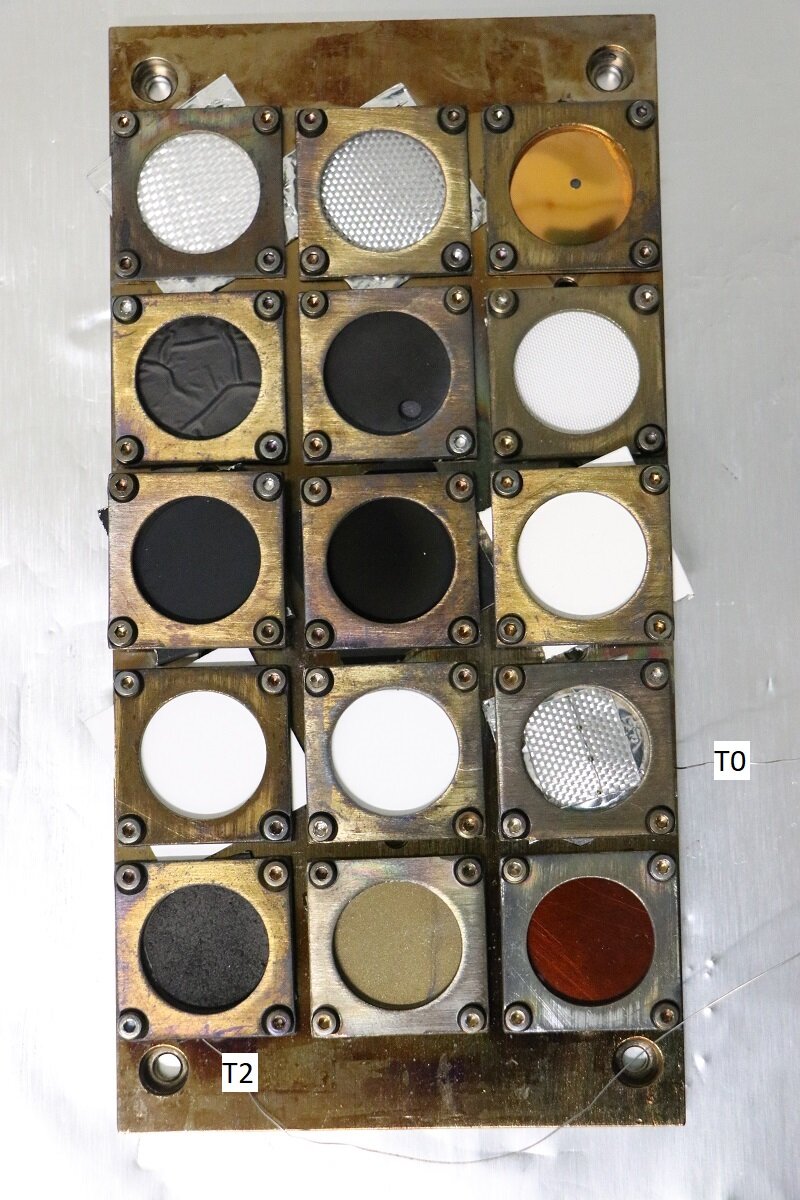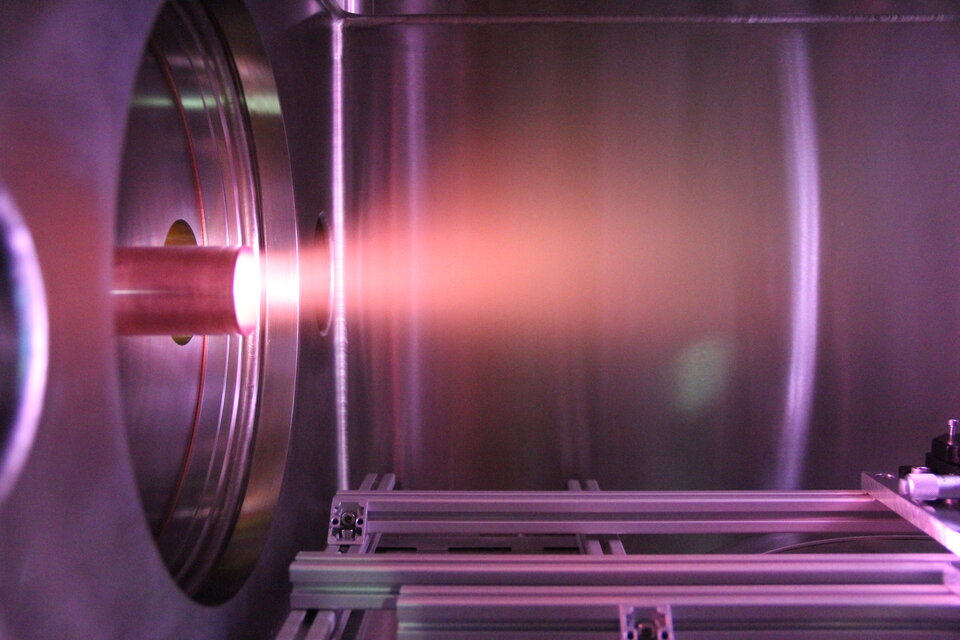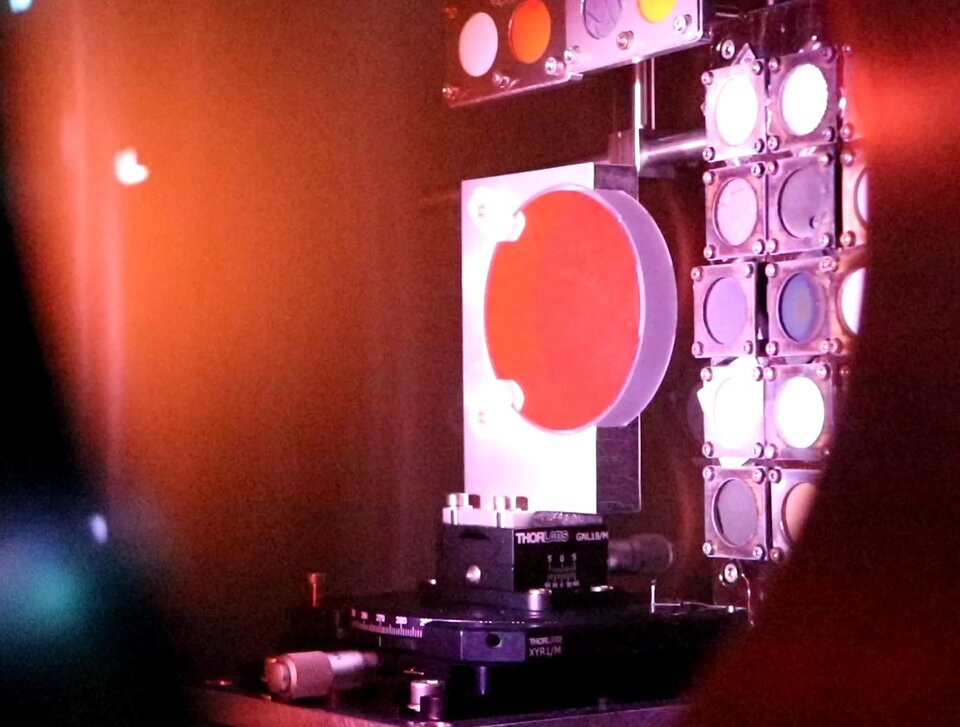ESA’s EnVision mission to Venus will perform optical, spectral and radar mapping of Earth’s sister planet. But before getting down to work the van-sized spacecraft needs to ‘aerobrake’ – lowering its orbit with thousands of passages through the planet’s hot, thick atmosphere for up to two years. On July 26, 2022, ESA announced that a unique ESA facility is currently testing candidate spacecraft materials to check they can safely withstand this challenging process of atmospheric surfing.
“EnVision as currently conceived cannot take place without this lengthy phase of aerobraking,” explains ESA’s EnVision study manager Thomas Voirin. “The spacecraft will be injected into Venus orbit at a very high altitude, at approximately 250 000 km, then we need to get down to a 500 km altitude polar orbit for science operations. Flying on an Ariane 62, we cannot afford all the extra propellant it would take to lower our orbit. Instead we will slow ourselves down through repeated passes through the upper atmosphere of Venus, coming as low as 130 km from the surface.”
EnVision’s predecessor spacecraft, Venus Express, performed experimental aerobraking during the final months of its mission in 2014, gathering valuable data on the technique. Aerobraking was used operationally for the first time in 2017 by ESA’s ExoMars Trace Gas Orbiter (TGO) to lower its orbit around the Red Planet over an 11 month period.
Thomas notes: “Aerobraking around Venus is going to be much more challenging than for TGO. To begin with, the gravity of Venus is about 10 times higher than that of Mars. This means velocities about twice as high as for TGO will be experienced by the spacecraft when passing through the atmosphere – and heat is generated as a cube of velocity. Accordingly, EnVision has to target a lower aerobraking regime, resulting in an aerobraking phase twice as long.
“On top of that, we are also going to be much closer to the Sun, experiencing around double the solar intensity of Earth’s, with the thick white clouds of the atmosphere reflecting a lot of sunlight straight back to space, which additionally needs to be taken into account. Then on top of all that, we realised we had to reckon with another factor over the thousands of orbits we envisage, previously only experienced in low Earth orbit: highly-erosive atomic oxygen.”
This is a phenomenon that remained unknown during the first decades of the space age. It was only when early Space Shuttle flights returned from low orbit in the early 1980s that engineers received a shock: the spacecraft’s thermal blankets had been severely eroded.
The culprit turned out to be highly reactive atomic oxygen – individual atoms of oxygen at the fringes of the atmosphere, the result of standard oxygen molecules of the kind found just above the ground being broken apart by powerful ultraviolet radiation from the Sun. Today, all missions below about 1 000 km need to be designed to resist atomic oxygen, such as Europe’s Earth-watching Copernnicus Sentinels or any hardware built for the International Space Station.
Spectral observations by past Venus orbiters of airglow above the planet confirm that atomic oxygen is widespread at the top of the Venusian atmosphere too, which is more than 90 times thicker than Earth’s surrounding air.
Thomas says: “The concentration is quite high, with one pass it doesn’t matter so much but over thousands of times it starts to accumulate and ends up with a level of atomic oxygen fluence we have to take account of, equivalent to what we experience in low-Earth orbit, but at higher temperatures.”
The EnVision team turned to a unique European facility specifically built by ESA to simulate atomic oxygen in orbit. The Low Earth Orbit Facility, LEOX, is part of the Agency’s Materials and Electrical Components Laboratory, based at ESA’s ESTEC technical centre in the Netherlands.
ESA materials engineer Adrian Tighe explains: “LEOX generates atomic oxygen at energy levels that are equivalent to orbital speed. Purified molecular oxygen is injected into a vacuum chamber with a pulsing laser beam focused onto it. This converts the oxygen into a hot plasma whose rapid expansion is channelled along a conical nozzle. It then dissociates to form a highly energetic beam of atomic oxygen.
“To work reliably, the laser timing must stay precise to millisecond scale, and directed to an accuracy measured in thousandths of a millimetre, throughout the four-month duration of this current test campaign.
“This isn’t the first time that the facility has been used to simulate an extraterrestrial orbital environment – we have previously performed atomic oxygen testing on candidate solar array materials for ESA’s Juice mission, because telescopic observations suggest atomic oxygen will be found in the atmospheres of Europa and Ganymede. However, for EnVision the heightened temperature during aerobraking poses an additional challenge, so the facility has been adapted to simulate this more extreme Venusian environment.”
A range of materials and coatings from different parts of the EnVision spacecraft, including multi-layer insulation, antenna parts and star tracker elements are placed within a plate to be exposed to the purple-glowing LEOX beam. At the same time this plate is being heated to mimic the expected thermal flux, up to 350°C.
Thomas adds: “We want to check that these parts are resistant to being eroded, and also maintain their optical properties – meaning they do not degrade or darken, which might have knock-on effects in terms of their thermal behaviour, because we have delicate scientific instruments that must maintain a set temperature. We also need to avoid flaking or outgassing, which lead to contamination.”
This current test campaign is part of a larger panel looking into EnVision aerobraking, including the use of a Venus climate database developed from previous mission results to estimate the local variability of the planet’s atmosphere to set safe margins for the spacecraft.
The results of this test campaign are expected at the end of this year.
European Space Agency: Making space accessible and developing the technologies for the future





